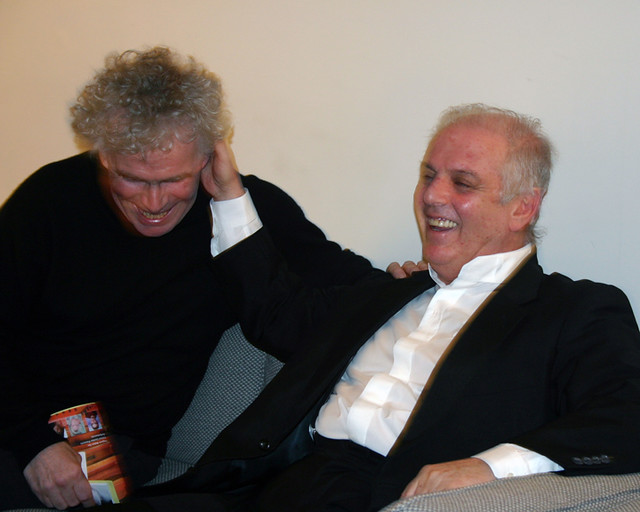Among various updates for the Mahler concert stopped last night by a ringtone was an absurd tale of concertgoers being pestered for money during the performance. Does this sort of thing still happen?

Among various updates for the Mahler concert stopped last night by a ringtone was an absurd tale of concertgoers being pestered for money during the performance. Does this sort of thing still happen?
I’m surprised and delighted to find that the BBC have kept my Lebrecht Interviews from last summer as free podcasts, for the time being.
Download here for Thomas Quasthoff talking about love, death, disability, relationships, hopes and equanimity. I may never meet a more balanced or agreeable artist.

Luis Sunen, editor of Madrid-based scherzo magazine, has been trying for years to introduce The Master to a Spanish public. He has finally succeeded in the January issue, out now, where the great man talks about Leonard Bernstein, casting difficulties and hearing Sweeney Todd in Catalan.
Here‘s an extract from the printed version.

One of the great baritone’s few regrets was that the world had not seen enough of his versatility. He released two jazz albums through Deutsche Grammophon but neither was well marketed or got wide play.
To get a wider appreciation of this extraordinary artist, and remember his sheer sense of fun, you’ve got to watch these videos.
Bebopping with Bobby
Being himself
I’ve just talked to Tommy Quasthoff and had confirmation of his very sad decision to give up singing, for persistent health reasons, at the age of 52.
‘But I am totally happy with it!!!!” says Tommy, who is one of the sweetest natured men alive.
Tommy told his friend and agent, Helga Machreich-Unterzaucher, that he had always played in the Champions League and was not willing to do anything that was below his phenomenally high standard. I, and all his friends and admirers, will greatly respect that decision.
He is, however, not going to disappear. He will contine to serve as a judge on the Wigmore Hall singing competition and to present his live interviews in a small Berlin concert hall. He is full of life and eager to share it.
Here’s a press statement in English that is just going out from the agency Press Release.
Quasthoff, who was born with terrible disabilities, has been described by Dietrich Fischer-Dieskau as the greatest male lieder singer of our time.
Here’s an archived piece I wrote about him 11 years ago.
Here’s the man at his best.
And here’s an extract from something I wrote after spending an afternoon with him last summer.
He is just 1.34 metres tall and has very short arms, the consequence of a drug called Thalidomide that his mother was prescribed during pregnancy. His first years were spent in hospital among cerebral palsy sufferers and he was not expected to live very long. Only the support of a close family and his own innate humour and stubbornness enabled him to transcend his circumstances and find his voice in art. ‘I’m a normal person, only shorter,’ he will tell you, a huge grin stretched across his face.
Listen to the full conversation here.
Remberto Becker, a member of the Buena Vista Social Club, has died aged 101.

His two key songs are “De Ti Enamorado”
and “Como Cambian Los Tiempos”.
A friend mentioned that he’s going to Berlin at the weekend to hear Barenboim conduct Dream of Gerontius with the Philharmonic. Some mistake, surely? I protested.
Elgar is prime Rattle territory. Why would he relinquish it to a local rival?
The answer is more tactical than strategic. Both men are consummate politicians who know how to give a bit here, take a bit there. They have a range of common interests and a need to safeguard their empires.
Knowing that Barenboim learned his Elgar from Sir John Barbirolli and wanted to conduct the Dream in tribute, Rattle graciously consented.
It’s a win-win for him. If Barenboim triumphs, Rattle will be praised for generosity, if he fails the Englishman can show how it’s done next season.
The affinities stretch beyond Berlin. Yesterday, Rattle was announced with Placido Domingo as co-winner of the state of Israel’s biggest arts prize. Barenboim was awarded the Wolf in 2004 and accepted it with a Knesset speech dissenting from the state’s Palestine policies. Will he advise Rattle to so something similar? He has invited Rattle often to conduct at the Berlin Staatsoper. Might he now introduce him at La Scala?
The dance continues, and it’s one of the more entertaining spectacles at a dulled-down classical summit.

photo: Evelyn Taylor, flickr.com

(courtesy Digital Music News)
Last night’s New York Philharmonic performance of Mahler’s ninth symphony tapered off 13 bars before the end when a phone went off in the front row.
Conductor Alan Gilbert turned to the offender and, as Paul Pelkonen reports in his excellent Superconductor blog (with detail from a close bysitter), subjected him to public humiliation.
He then picked up from rehearsal number 118 and led the symphony to its quiet close.
UPDATE: Here‘s a report sent in by another audience member, Amanda Keil. And one more here.
What’s to be done about phones in live concerts? Simple. The hall should cut off the signal during performance. Right?
There are two Petrenkos in the reckoning for future glory. Vassily Petrenko heads the philharmonic orchestras of Liverpool and Oslo, while Kirill P, who was music director of Komische Oper Berlin, takes over Bavarian State Opera next year.
The bad news is that Kirill, 40, has just crashed out of next week’s Iolanta and Francesca da Rimini in Vienna. The reason is severe back pain, one of the worst blights for a rising conductor.

Gives a whole new meaning to getting high.